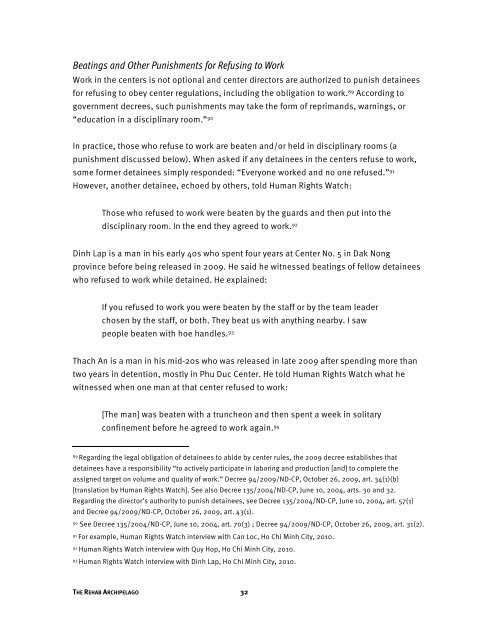The Rehab Archipelago - Human Rights Watch
The Rehab Archipelago - Human Rights Watch
The Rehab Archipelago - Human Rights Watch
Create successful ePaper yourself
Turn your PDF publications into a flip-book with our unique Google optimized e-Paper software.
Beatings and Other Punishments for Refusing to Work<br />
Work in the centers is not optional and center directors are authorized to punish detainees<br />
for refusing to obey center regulations, including the obligation to work. 89 According to<br />
government decrees, such punishments may take the form of reprimands, warnings, or<br />
“education in a disciplinary room.” 90<br />
In practice, those who refuse to work are beaten and/or held in disciplinary rooms (a<br />
punishment discussed below). When asked if any detainees in the centers refuse to work,<br />
some former detainees simply responded: “Everyone worked and no one refused.” 91<br />
However, another detainee, echoed by others, told <strong>Human</strong> <strong>Rights</strong> <strong>Watch</strong>:<br />
Those who refused to work were beaten by the guards and then put into the<br />
disciplinary room. In the end they agreed to work. 92<br />
Dinh Lap is a man in his early 40s who spent four years at Center No. 5 in Dak Nong<br />
province before being released in 2009. He said he witnessed beatings of fellow detainees<br />
who refused to work while detained. He explained:<br />
If you refused to work you were beaten by the staff or by the team leader<br />
chosen by the staff, or both. <strong>The</strong>y beat us with anything nearby. I saw<br />
people beaten with hoe handles. 93<br />
Thach An is a man in his mid-20s who was released in late 2009 after spending more than<br />
two years in detention, mostly in Phu Duc Center. He told <strong>Human</strong> <strong>Rights</strong> <strong>Watch</strong> what he<br />
witnessed when one man at that center refused to work:<br />
[<strong>The</strong> man] was beaten with a truncheon and then spent a week in solitary<br />
confinement before he agreed to work again. 94<br />
89 Regarding the legal obligation of detainees to abide by center rules, the 2009 decree establishes that<br />
detainees have a responsibility “to actively participate in laboring and production [and] to complete the<br />
assigned target on volume and quality of work.” Decree 94/2009/ND-CP, October 26, 2009, art. 34(1)(b)<br />
[translation by <strong>Human</strong> <strong>Rights</strong> <strong>Watch</strong>]. See also Decree 135/2004/ND-CP, June 10, 2004, arts. 30 and 32.<br />
Regarding the director’s authority to punish detainees, see Decree 135/2004/ND-CP, June 10, 2004, art. 57(1)<br />
and Decree 94/2009/ND-CP, October 26, 2009, art. 43(1).<br />
90 See Decree 135/2004/ND-CP, June 10, 2004, art. 70(3) ; Decree 94/2009/ND-CP, October 26, 2009, art. 31(2).<br />
91 For example, <strong>Human</strong> <strong>Rights</strong> <strong>Watch</strong> interview with Can Loc, Ho Chi Minh City, 2010.<br />
92 <strong>Human</strong> <strong>Rights</strong> <strong>Watch</strong> interview with Quy Hop, Ho Chi Minh City, 2010.<br />
93 <strong>Human</strong> <strong>Rights</strong> <strong>Watch</strong> interview with Dinh Lap, Ho Chi Minh City, 2010.<br />
THE REHAB ARCHIPELAGO 32

















